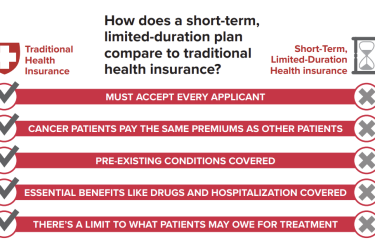Employers’ health insurance cost increases will remain relatively low next year at 4.8 percent, according to preliminary results from Mercer’s National Survey of Employer-Sponsored Health Plans 2013. Last year, benefits consultant Mercer reported cost increases for 2013 were 4.1 percent, a 15-year low.
The preliminary results come from a survey of 2,000 employers. The full survey will be released next month and will include results from 2,800 companies, according to an article by Jerry Geisel in Business Insurance.
Geisel added that employers will see health plan costs rise in the coming years as they implement provisions in the Affordable Care Act. For health care journalists, how employers react to these changes will be a trend to watch.
In 2015, employers with 50 full-time employees or more who work an average of at least 30 hours each week will need to provide coverage to those employees or pay a $2,000 per-employee penalty.
The survey showed that among employers seeking to avoid the $2,000 fine, some (11% of those with at least 500 employees) will reduce some workers’ hours to less than 30 per week, the survey showed. “But most employers affected by the rule will simply open their plans to all employees working 30 hours per week and brace for rising enrollment,” Geisel reported.
Among employers with 500 or more workers, about 33 percent do not currently offer coverage to all employees working 30 or more hours per week, Mercer said. Generally, these companies are retailers, restaurants, and hotel chains that rely on part-timers.
Asked what effect the ACA would have on benefit costs next year, about half of the employers surveyed said they expect to spend at least 2 percent more on health benefits next year due to the ACA in addition to the normal cost increases. One third were unable to predict the effect of the ACA, and one fifth believed the law would have little or no effect on spending in 2014.
Several factors have contributed to keeping costs low the past two years, including the recession, said Beth Umland, Mercer’s director of research for health and benefits. Other factors include changes employers have made in benefit programs such as implementing high-deductible health plans and wellness programs. Next year, more employers will control costs by shifting workers to private exchanges, she added.
Even as the exchanges are being introduced, most employers are not dropping health insurance coverage, Mercer noted. Just 5 percent of large employers say they will terminate their health plans within the next five years, the survey results showed. About 20 percent of smaller employers (meaning those with fewer than 200 employees) say they are likely to terminate their plans, however, Mercer reported.
There is a significant change looming under the ACA that could affect how many employers continue offering health benefits to workers, however. In 2018, employers will pay a 40 percent tax on health coverage costing over $10,200 for individuals or $27,500 for families, Mercer warned. This provision is called the Cadillac tax and will be a factor to watch in the coming years.










